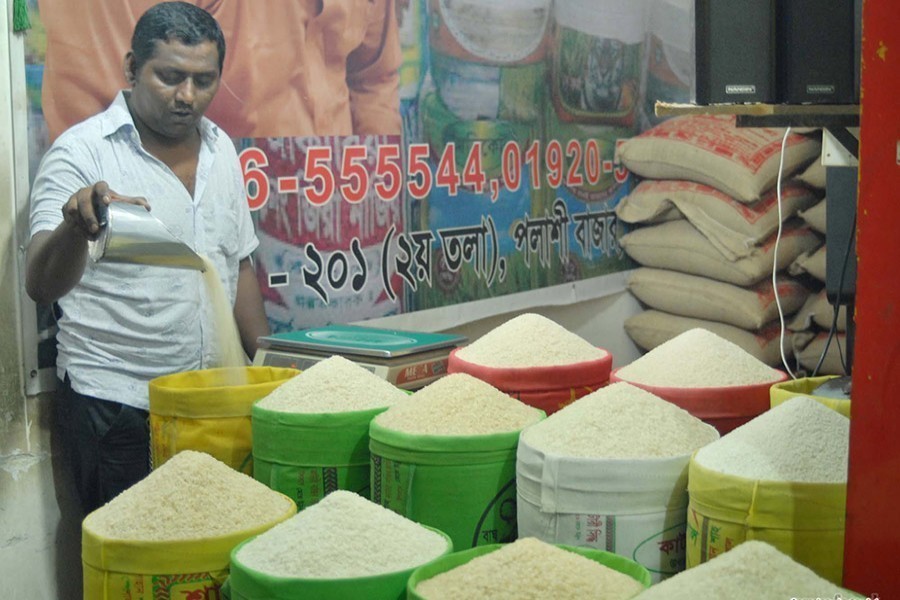The price of rice has further increased in the kitchen market, battering the consumers who are already hit hard by the skyrocketing trend of most commodities.
Insiders cite hoarding by millers and traders amid rising Covid cases, high import duty as well as mounting transport costs as reasons for the hike even during this peak Aman harvest and trading season.
Prices of finer and medium varieties saw a hike as finer grains like miniket, jeera, BRRI dhan 49/nazirsail were sold at Tk 66-86 a kg-a Tk 2.0-4.0 hike.
Medium variety BRRI dhan 28 and 29 have been sold at Tk 56-58 a kg depending on quality and brands, showing a Tk 3.0 hike a kg in the past seven days.
Coarse rice like swarna-5, guti swarna and hybrid showed a Tk 1.0-2.0 hike a kg as sold at Tk 50-52 a kg in Dhaka and Chattogram cities on Monday.
Rice prices also rose by Tk 2.0-3.0 a kg in milling hubs like Naogaon, Joypurhat, Natore, Pabna, Rajshahi, Kushtia and Dinajpur, discloses Bangladesh Auto Major and Husking Mill Owners Association.
"Rice prices have surged amid almost stoppage of imports from November last," says Md Assaduzzaman, a Mohammadpur Agricultural Market-based wholesaler.
Prices of off-season varieties like BRRI dhan 28, miniket and jeera have increased amid almost stoppage of import as the duty is now 61.5 per cent, he adds.

Nazirsail or BRRI dhan 49 has also risen in price for low import as a major demand for such kind of rice is met from imports, according to Mr Asaduzzaman.
Local BRRI dhan 49 (locally called as nazirsail) is selling at Tk 78-86 a kg and almost similar type of imported variety at Tk 70-75.
He also pointed out that transport cost has increased to Tk 2.0 a kg after the diesel price hike which was maximum Tk 1.0 a kg earlier.
"Many of the millers and big traders are hoarding a huge quantity of rice and paddy fearing any further restriction for rising Covid-19 cases," says Nilphamari-based trader Asim Dam.
Both auto and semi-auto rice millers have bought large quantities of paddy this Aman season to maintain their market operation until May, he adds.
Mr Asim says coarse rice like hybrid sells at Tk 40-42 a kg in Rangpur region which can surpass Tk 46-47 with the end of the primary trading in January.
Market expert and farm economist Prof Golam Hafeez Kennedy says rice prices have been rising even during the peak harvest period.
Hike might happen for real or artificial causes, but the government should recognise quickly that there is a predicament and which can enhance further in the coming months, he suggests.
"So, import duty should be minimised for the private sector immediately to source a good quantity of rice from the global sources before any notable price surge in the international market with a very possible bite of the third wave of the pandemic."
The farm economist suggests that the government its food stock be at 2.0-2.5 million tonnes to tackle any possible crisis.
He also puts emphasis on strict market monitoring both in city wholesale and milling hubs to prevent any illegal hoarding or artificial price hike.
Consumers Association of Bangladesh vice-president SM Nazer Hossain stresses countrywide open-market sale of rice at subsidised rate to help the poor, low-income groups during this pandemic.
The government has now a good stock of rice which should be distributed to prevent hunger among millions, he asserts.
According to food ministry, public warehouses have a good stock of 1.93-million tonnes of grains, with rice having 1.55-million tonnes.
The government bought so far nearly 0.4-million tonnes of rice and paddy this Aman season out of its targeted 0.8-million tonnes within February 28.


